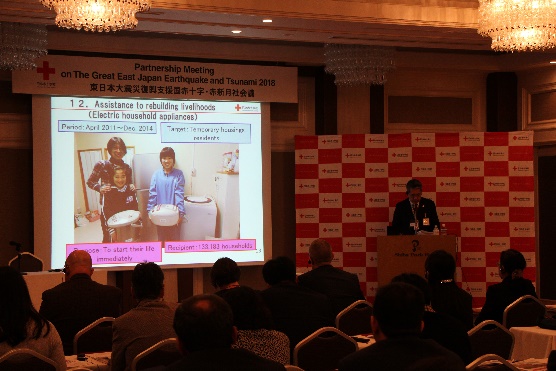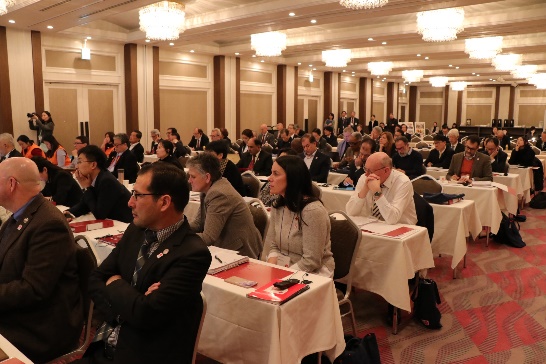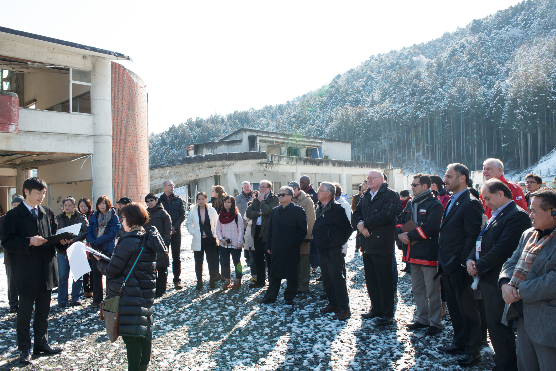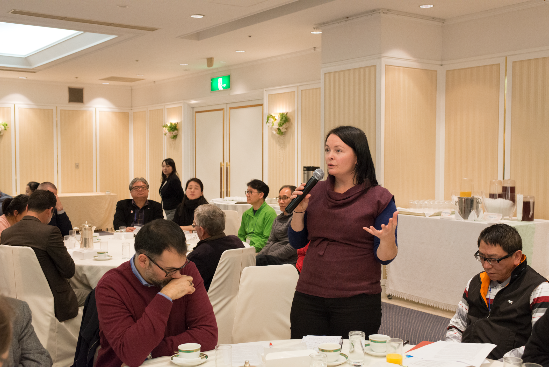General review of the Programmes
Engagement of the JRCS based on the evaluations and recommendations
1. Recommendations identified in the evaluations
Based on the evaluations done by the international independent experts and the third-party consultant, the JRCS has taken actions to improve its future activities. The points addressed by the evaluations can be summarized into eight recommendations. These are valid not only for the response in the GEJET, but also for the future recovery assistance which may be carried out by any National Societies of the International Red Cross and Red Crescent Movement.
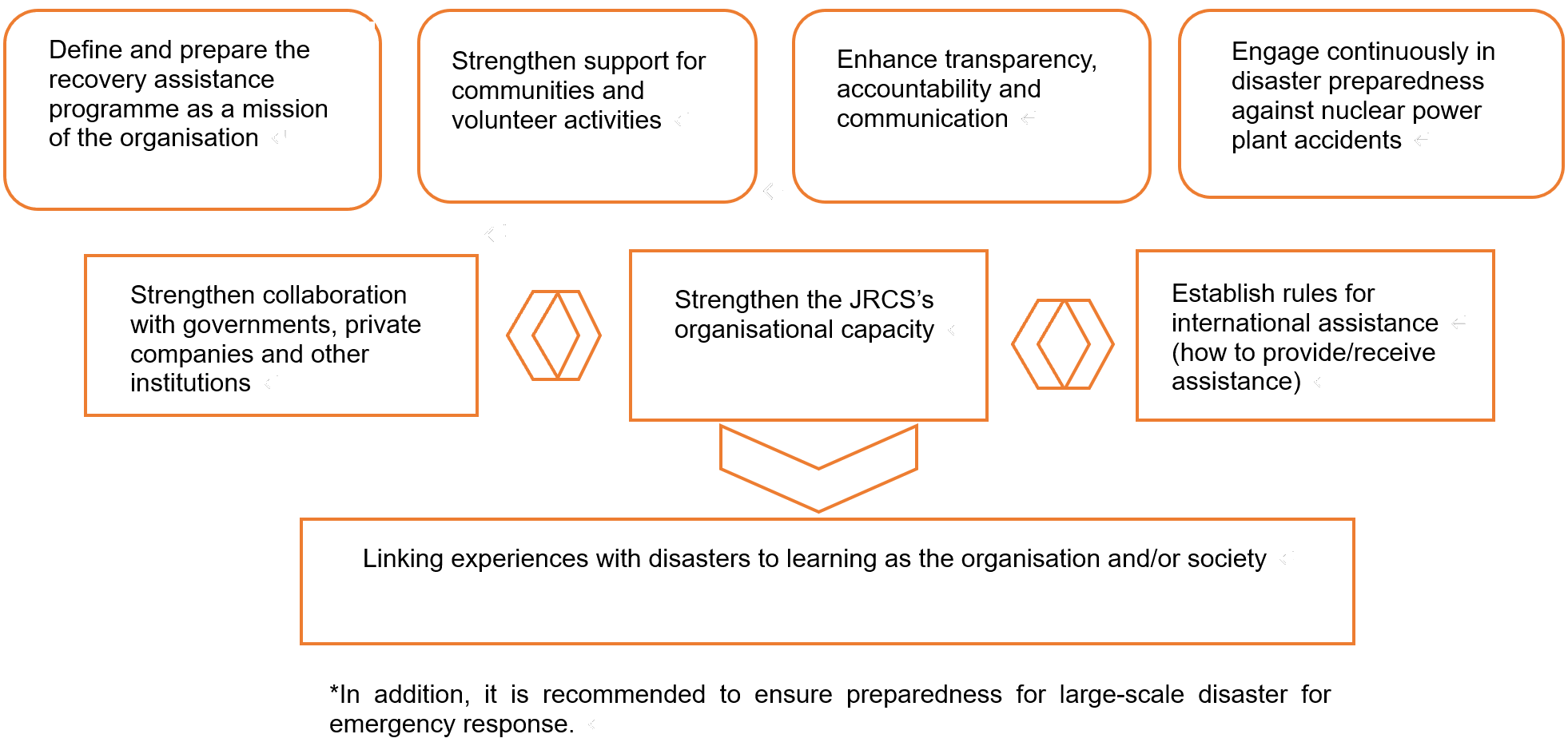 Figure 8-1 Eight recommendations from the evaluations
Figure 8-1 Eight recommendations from the evaluations
2. Response Policy based on the evaluations and the recommendations
Based on the experiences and lessons learned from the GEJET, action points have been developed for improvement.
(1) Define and prepare the recovery assistance programme as a mission of the organisation
- ・Agree on a support plan at the time of a large-scale disaster between the IFRC and the JRCS;
- ・Develop and introduce recovery policies and plans;
- ・Establish systems and guidelines for implementation of recovery support activities and develop tools to promote the implementation;
(2) Strengthen support for communities and volunteer activities
- ・Clarify the roles of the JRCS in times of disasters and crises, define and strengthen community support and roles of volunteers. Rebuild and revitalize volunteer organisations in the medium to long term;
- ・Share with other JRCS Chapters the experiences and the lessons learned from the community-based services and the activities through volunteers in the GEJET;
- ・Promote the cooperation among sister National Societies in community-based services and activities through volunteers;
- ・Organise international exchange programmes on long-term community-based psychosocial support programmes, and exchange expertise in this area as well as develop programmes;
- ・Conduct a survey to clarify the needs and the relevance of long-term psychosocial care programmes by volunteers in order to support individuals and communities affected by the GEJET as a part of the recovery programmes;
- ・Strengthen and diversify the basis of trained volunteers and develop an effective system for their efficient mobilization and deployment. In addition, an effective system shall be developed to manage rapidly increasing numbers of volunteers at the time of disaster;
- ・Consider further strengthening the activities of volunteers’ groups in other prefectures to support the disaster-affected areas and building a cooperative system among volunteers’ groups;
(3) Enhance transparency, accountability and communication
- ・Innovate a new brand image of the JRCS as an “organisation accessible for the communities” and actively control its image;
- ・Develop a good model framework of accountability for beneficiaries and mechanisms for beneficially communication as well as for feedback;
- ・Strengthen organisational awareness and application of accountability to beneficiaries;
- ・Equip and develop the capacity and competencies to communicate important post-disaster information through the Internet and social media;
- ・Enhance communication with stakeholders regarding projects and financial resources;
(4) Engage continuously in disaster preparedness against nuclear power plant accidents
- ・Formulate guidance for the Movement to address the humanitarian consequences of a nuclear disaster by the IFRC, jointly with the ICRC;
- ・Contribute to the society by establishing the Red Cross Nuclear Disaster Resources Center to collect, archive and publish valuable information related to its disaster response, as a National Society who had an experience of responding to a nuclear disaster;
- ・Maintain the position of senior officer for nuclear preparedness for at least three years. Ensure funding for this purpose;
- ・Elaborate the domestic and international roles in dealing with the humanitarian consequences of a nuclear accident;
(5) Strengthen collaboration with governments, private companies and other institutions
- ・Engage into concrete partnerships with key stakeholders in the private and public sectors. Establish connections between the JRCS and the media at national and prefectural levels, as well as between public and private organisations and individuals, both of which are the JRCS's support network;
- ・Promote the establishment of a framework for cooperation and coordination with related organisations, and coordinate and collaborate future activities;
- ・Raise awareness among key private companies and NGOs; and agree on revitalization of each activities in the coming years by signing Memorandum of Understandings with the partners.
(6) Strengthen the JRCS’s organisational capacity
- ・Continue to build the capacity of its public relations team to transmit and communicate information externally;
- ・Disseminate among its staff internationally accepted standards (e.g. Sphere, the Listening Project, Humanitarian Accountability Project) and apply them to its future disaster response;
- ・Develop a strategy and strengthen the structure of the organisation at all levels in line with the strategic objectives;
- ・Organise regular international learning workshops for national disaster management teams;
- ・Promote a mutual exchange process between domestic and international departments;
- ・Join the OCAC process, and conduct self-assessment for the future;
- ・Develop a Standard Operating Procedures (SOPs) for a Task Force, including clear terms of reference;
- ・Develop tools such as templates and forms for preparation and development of a plan of action, accountability, needs assessment, requests, project proposals, procedures for approval, etc.;
- ・Develop management/monitoring tools for budgets, cost management, schedule management/planning;
- ・Build capacity for needs assessment. Establish a system to mobilize an rapid needs assessment team;
- ・Consider introducing more systematic training and organisational structures for volunteers (members of JRCS volunteer groups) for their activities in disaster;
(7) Establish rules for international assistance (how to provide/receive assistance)
- ・ Consider what support should be provided by the IFRC and how the Host National Society in the affected country should respond in cases the Host National Society receives relief funds from overseas “without a request for international assistance (or Emergency Appeal)". In addition, how to share the cost incurred in connection with the support provided by the IFRC;
- ・Consider and develop a clear operational framework that can be used when Red Cross and Red Crescent National Societies in developed countries accept voluntary supports from their Partner National Societies;
- ・With regard to assistance other than funds from the Partner National Societies, consider a concrete scope and methods to accept such assistance;
(8) Link experiences with disasters to learning as the organisation and/or the society
- ・Ensure a consistent and practical follow-up on the evaluations by the IFRC and the third-party consultant, and lead them into oranisational learning and change.;
- ・Promote a more systematic learning approach so that the National Society in a large scale disaster can play a role to improve the IFRC as a whole;
- ・Organise a general review and a report on the recovery assistance programmes;
The JRCS’s commitment to the disaster management cycle
1. Response of the JRCS
The JRCS has taken actions in response to the recommendations which were shared with the Partner National Societies of the International Red Cross and Red Crescent Movement around the world.
(1) Define and prepare the recovery assistance programme as a mission of the organisation
Based on the experiences of the GEJET, the JRCS has decided to engage in a whole disaster management cycle consistently by introducing disaster prevention and risk reduction activities in peace time as well as assistance activities for the affected people during the recovery period, in addition to its traditional emergency response.
- ・Revision of the JRCS’s Relief Rules,
The JRCS defined each activity of “emergency response”, “recovery / reconstruction”, “disaster preparedness / risk reduction” in the disaster management cycle, and made a revision of the JRCS’s Relief Rules as well as a revision/establishment/abolishment of related rules. Disaster response capacity will be strengthened by preparation and training on concrete duties. - ・Formulation of the Basic Policy for the Recovery Assistance Programme
The JRCS formulated the Basic Policy for its programme in the recovery and reconstruction phase in order to restore lives, health, and dignity of the affected people, reconnect communities, and support reconstruction for the future.
(2) Strengthen support for communities and volunteer activities
- ・The JRCS has strengthened collaboration among JRCS volunteer groups beyond their communities or types
- ・The JRCS has provided the volunteers with an opportunity to visit the areas affected by the GEJET and to create volunteering opportunities for their activities
- ・The JRCS shall develop the capacity of the volunteers and train them as trainers on disaster prevention education programme
(3) Enhance transparency, accountability and communication
- ・The JRCS has provided education and training opportunities for the staff ot Chapters to transmit and communicate information
- ・The JRCS has utilized social media for public relations at the time of disaster
- ・The JRCs has reviewed its Public Relations Activity Manual in disasters
(4) Engage continuously in disaster preparedness against nuclear power plant accident
- ・The JRCS has established and operated the Red Cross Nuclear Disaster Reference Centre
- ・The JRCS has prepared guidelines for relief activities in nuclear disasters and provided education and training.
(5) Strengthen the JRCS’s organisational capacity
- ・The JRCS has strengthened collaborations among the JRCS’s departments
- ・The JRCS has restructured its management system to be involved in the entire disaster management cycle in peace time and in recovery as well as in emergency .
- ・The JRCS has ensured that the staff understand and work according to the international standards.
- ・The JRCS has enhanced its organisational capacity through the OCAC
- ・The JRCS has promoted better understanding of the international standards within the JRCS and reviewed relevant regulations.
(6) Strengthen collaboration with governments, private companies and other institutions
- ・The JRCS has strengthened collaboration with private companies and established a communication platform with donors.
- ・The JRCS has reviewed the Framework Agreement with the Cabinet Office
- ・The JRCS has prepared programmes to promote social contribution of private companies
- ・The JRCS has conducted preliminary discussion with corporate partners regarding their possible collaboration at the time of disaster.
(7) Respond to international standards and international cooperation
- ・The JRCS has promoted international cooperation
- ・The JRCS has shared examples of the JRCS’s disaster management and preparedness with National Societies of the International Red Cross and Red Crescent Movement
- ・The JRCs has contributed to formulate the IFRC’s Guidelines for Radiological Disaster Response and Preparedness
- ・The JRCS has requested the IFRC and shall continue discussion on establishment of basic rules on roles and cost-sharing among the partners of the Movement without a launch of an Emergency Appeal.
(8) Link experiences with disasters to learning as the organisation and/or the society
- ・The JRCS has collected and archived information related to the activities of the JRCS medical relief teams in Fukushima Prefecture
- ・The JRCS has carried out the third-party evaluation for the recovery assistance programmes
- ・The JRCS has reported and summarized the recovery assistance programmes
2. General review of the programmes
In 2018, the JRCS conducted a general review on the achievements and challenges of the recovery assistance programmes from 2011 until the end of FY2017. A comprehensive report was prepared covering a whole projects implemented to date.
Based on the experiences and the lessons learned from the GEJET, a Basic Policy for the Recovery Assistance Programme was formulated in preparation for large-scale disasters that may occur in the future. The JRCS also held the third Partnership Meeting on the GEJET in 2018.
3. Basic Policy for the Recovery Assistance Programme
(1) Background
This policy stipulates the basic concept of the programme which the JRCS may implements during the recovery period after a disaster.
The JRCS shall conduct recovery assistance based on its mission by utilizing its competence, knowledge and network fostered in its activities in peace time.
(2) Full text of the Basic Policy for the Recovery Assistance Programme
Basic Policy for the Recovery Assistance Programme
1. Our philosophy of recovery assistance
・Aiming to contribute to rebuild the livelihoods of the people whose life bases have been significantly damaged, the JRCS, with its every effort, will alleviate their physical and mental sufferings and maintain their health.
・The JRCS will link learnings from disasters to enhancement of the disaster response capability of communities and its citizens.
2. Our principles for recovery assistance
(1) To provide assistance in accordance with the Seven Fundamental Principles of the Red Cross and Red Crescent Movement and relevant international standards.
(2) To fully utilize the human resources and organisational capacity of the Red Cross and the Red Crescent Movement.
(3) To utilize the experience, knowledge and network fostered in our peace time activities.
(4) To collaborate and cooperate with governments, companies and other institutions related to the recovery assistance.
(5) To aim to plan our recovery assistance which can be integrated into the activities of the affected communities at later stage.
(6) To make sure transparency and accountability can be secured to the affected people and our partners.
3. Field of activities
Recovery assistance will be provided in the following areas:
(1) Assistance to help affected people support themselves
By restoring human relationships, communities and daily lives to support independence
(2) Assistance for medical and health care services
Support to protect the physical and mental health of disaster victims despite prolonged evacuation and unfamiliar living conditions
(3) Assistance for social welfare services
Support for the elderly and persons with disabilities and others who require special care to live healthy and dignified lives
(4) Assistance for children education to enable them to succeed our next generation (education)
To enable children to live like children and to grow and develop mentally and physically healthy.
Providing a place to play and supporting a healthy life.
(5) Preparation for future disasters
Based on the lessons learned from the disaster, in order to enhance self-help and mutual assistance, local communities, etc.
Support disaster prevention and mitigation efforts.
(6) Reception and distribution of donations for Cash Grants
When deemed necessary based on the situation of the disaster victims, the receipt of donations following emergency response. and allocation shall be made.
(7) Other assistance
Necessary support will be provided depending on the situation in disaster and the affected people and areas.
The Partnership Meeting on the Great East Japan Earthquake and Tsunami 2018
The Partnership Meeting on the Great East Japan Earthquake and Tsunami (GEJET) 2018 was held by the JRCS from 26 to 28 February 2018 with about 50 participants from 23 Partner National Societies (PNSs) as well as from the IFRC.
The aim was to share lessons learned from the recovery programmes implemented for seven years after the GEJET, and to discuss how to strengthen the resilience of the society to the disasters with the partners of the Interanational Red Cross and Red Crescent Movement.
At the end of the meeting, the message from the JRCS through collaboration with the Movement partners for the Great East Japan Earthquake and Tsunami of 11 March 2011 was released.
The participants also made a field trip to Tohoku region including Iwate, Miyagi, and Fukushima by visiting the Governor of Iwate, Onagawa Community Medical Center, Okawa primary school site in Miyagi, Katsurao village disaster recovery public housing, Fukushima Prefectural Centre for Environmental Creation and concluded the trip with a review session of the three-day meeting and the field visit. At the end of the meeting, the following message was released by the JRCS.
Message from the JRCS through collaboration with the Movement partners for the Great East Japan Earthquake and Tsunami
The Japanese Red Cross Society (JRCS) has learned very much from running the operation of this unprecedented disaster that was undertaken with an excellent cooperation and assistance from the Red Cross and Red Crescent partners worldwide. It hopes to share some of the key learnings with them, particularly in the following areas.
1. Given ever-increasing major disasters worldwide, National Societies are urged to act beyond emergency response and have themselves well-prepared in the form of promoting disaster preparedness education and any other initiatives which can be introduced through the One Billion Coalition for Resilience led by the International Federation of Red Cross and Red Crescent Societies (IFRC). It is critically important that the Red Cross Red Crescent enhances its holistic engagement in the integrated disaster management cycle by enhancing disaster preparedness, prevention, risk reduction as well as recovery, thus achieving “Build Back Better.”
2. Under the recovery operation, working together better with relevant stakeholders, including authorities/municipalities and community volunteers, is vitally important, and as is bringing affected populations to whom we hold ourselves accountable to the forefront of the design and implementation of our action. National Societies need to understand the recovery framework and its related activities of their own countries, and make clearer the division of roles and responsibilities, including for those of the public authorities as well as Red Cross Red Crescent volunteers.
3. Given that needs during the recovery phase are so diverse among affected areas and regions as compared with those of a response phase, National Societies are advised to establish the mechanism of receiving international support and assistance with due organisational flexibility, coping with the potential of a rapid and huge expansion in the recovery programme.
4. The outcome and issues of the JRCS GEJET recovery operation be summarized and shared, applying learnings to the enhancement of policies and procedures for the future recovery programming.
5. The JRCS, based upon valued learnings from the GEJET, will contribute to work out global standards in the recovery operation in close cooperation with the Movement partners. The global standards will assist the IFRC and its member National Societies to make clearer their roles and responsibilities for recovery.
6. We believe that our efforts should lead to enhancement of “resilience”, that is, communities’ coping capacity to recover from disasters. It is therefore important to review issues to achieve resilience during the recovery phase in the mid-to long-term thinking and make the most optimal use of those learnings in pursuit of protecting lives, health and well-being of the affected people.
